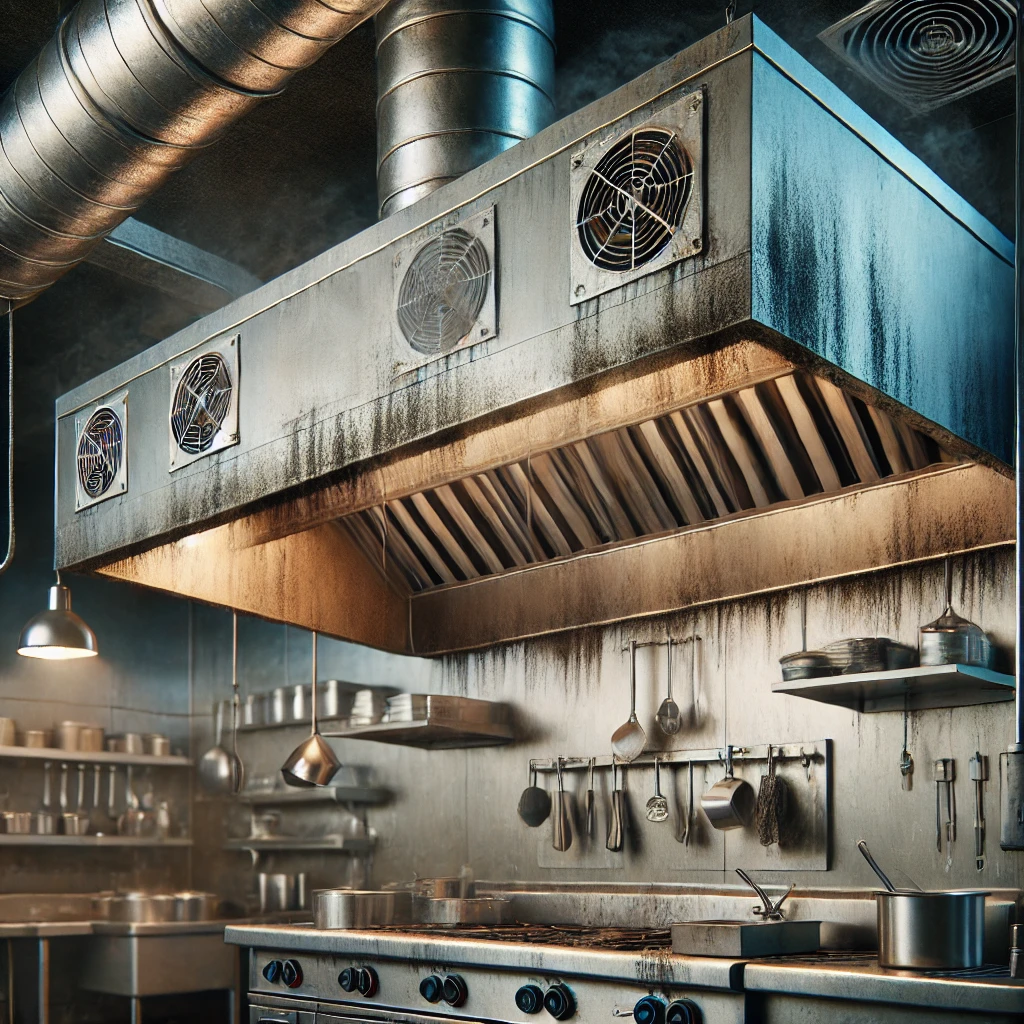Commercial kitchens operate with high-intensity cooking equipment that produces heat, smoke, and grease-laden vapors. To maintain a safe and efficient working environment, a well-maintained exhaust system is essential. This system not only regulates air quality but also reduces fire hazards and keeps the kitchen compliant with health and safety standards. In this article, we’ll go over the key indicators that signal when it’s time to call in a professional to service your commercial kitchen exhaust system.
1. Reduced Airflow and Poor Ventilation
One of the most common signs that an exhaust system requires attention is a noticeable reduction in airflow. When the exhaust system isn't functioning optimally, ventilation is compromised, which can lead to lingering smoke, humidity, and heat in the kitchen. These conditions create an uncomfortable work environment and may even impact the quality of food preparation.
Reduced airflow can result from blockages in the system, such as grease accumulation, dust, or other debris in the ducts. Regular cleaning of filters and fans can often prevent these issues. However, when airflow is noticeably weak or inconsistent, professional servicing is necessary to diagnose and resolve the root causes, ensuring that the system operates efficiently.
2. Grease Buildup on Surfaces
Excessive grease buildup on kitchen surfaces or around the exhaust hood is a clear indicator that the system is not filtering out cooking byproducts effectively. Grease tends to accumulate on duct walls, fans, and other parts of the exhaust system over time, creating a significant fire hazard if not managed. Moreover, grease deposits attract dust and other particles, which can worsen the blockage.
If grease accumulation is visible on surfaces near the hood or along the kitchen walls, it’s a sign that the system needs professional cleaning. Trained technicians can thoroughly clean and service the exhaust ducts and fans, restoring them to optimal function and helping to maintain a safer, cleaner kitchen environment. Scheduling regular exhaust maintenance can prevent these buildups from reaching hazardous levels.
3. Unusual Noises from the Exhaust Fan
Strange sounds coming from the exhaust fan are often early warning signs of mechanical issues. These noises may include grinding, squeaking, or rattling sounds, which can indicate problems such as worn-out bearings, loose parts, or motor issues. Ignoring these noises can lead to more significant damage, resulting in costly repairs or even system replacement.
Promptly addressing these sounds by contacting a professional can help resolve mechanical problems early. Skilled technicians can diagnose the exact cause and perform any necessary repairs or replacements, ensuring that the exhaust fan operates quietly and efficiently.
4. Foul Odors and Smoke Buildup
Lingering odors or visible smoke are telltale signs that your exhaust system isn’t effectively filtering the air. This may happen if filters are clogged, ducts are obstructed, or the fan is malfunctioning. If these issues aren’t resolved, the kitchen’s air quality can deteriorate, potentially impacting employees' respiratory health and customer experience in open-kitchen settings.
In addition, smoke buildup can create visibility issues and increase the risk of grease fires. If odors and smoke seem to persist or worsen, it’s essential to seek professional service to assess and clean the system. A properly serviced exhaust system should filter out cooking byproducts efficiently, maintaining a safe and fresh-smelling kitchen environment.
5. Increased Energy Costs
A less obvious but equally important sign of an inefficient exhaust system is an increase in energy costs. When exhaust fans and motors have to work harder due to blockages, grease buildup, or other issues, they consume more electricity. Over time, these rising energy costs can add up, impacting your kitchen’s profitability.
Monitoring monthly energy bills can help detect these changes early. If you notice a sudden or steady increase, it could indicate that your exhaust system is struggling. Professional servicing can restore efficiency to the system, potentially lowering energy consumption and costs.
6. Excessive Heat in the Kitchen Area
A properly functioning exhaust system helps remove not only smoke and odors but also heat. If the kitchen is becoming uncomfortably warm, especially during high-usage periods, it may be a sign that the system is struggling to extract heat from the cooking area. This can make it difficult for kitchen staff to work efficiently and safely.
Excessive heat can also strain other appliances and equipment, shortening their lifespan. Scheduling a checkup with a professional technician can identify whether blockages, fan issues, or other malfunctions
are causing the problem. Maintaining an adequate exhaust system temperature ensures a comfortable and productive work environment for kitchen staff.
7. Difficulty Meeting Health and Safety Regulations
Commercial kitchens must adhere to strict health and safety regulations, which often include ventilation standards. Frequent issues with regulatory compliance can indicate that your exhaust system is underperforming. Health inspectors typically look for signs of improper ventilation, such as visible grease, odors, or inadequate smoke extraction, which could lead to fines or even temporary closure.
Investing in regular exhaust system maintenance not only keeps your kitchen compliant but also reduces the likelihood of failed inspections. Professional servicing ensures that the exhaust system meets all necessary standards and operates at peak performance, creating a safer environment for both employees and patrons.
Conclusion and Recommendations
Recognizing the signs of a struggling exhaust system is essential for maintaining a safe, efficient, and regulation-compliant commercial kitchen. Whether it’s reduced airflow, strange noises, lingering odors, or high energy bills, these issues are best handled by experienced technicians who can diagnose and repair them effectively. Scheduling regular inspections and cleaning helps to prevent these problems, ensuring that your exhaust system continues to function optimally. For any commercial kitchen owner, routine professional maintenance is a valuable investment that supports both safety and operational efficiency.

